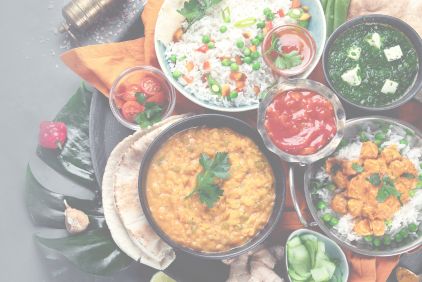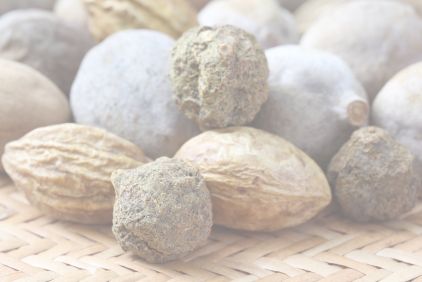To feel good, you should not eat "too much"... This is true, but it is not so obvious. In the West, food occupies a central place in our way of life and it can even be frowned upon not to help yourself at the table! In these conditions, the excess of flesh weighs on the organism, so we might as well learn to digest well with Ayurveda to transform the end of meals into a healthy walk...
Digestion is a complete process within our bodies. It begins when food passes through our lips and ends when it is passed in the stool; for our digestive system, it's quite a journey! It has to "cook" the food and then transform it into a material that can be absorbed by our body. And this is vital... Food is so important that Hippocrates would have said: "Let your food be your medicine".
Indeed, what we eat and the way we digest it will condition our physical and mental health and even our beauty. A few examples may come to mind, such as an excess of chocolate that triggers oily skin and sometimes pimples, or a meal based on cabbage that produces smelly stools... On the other hand, a well-chosen and balanced diet stimulates vitality and a radiant complexion.
Why is food so important?

The choice of what we eat conditions who we are and what we do. Some people are aware of this, others are not. Sportsmen and women, for example, adopt a high-protein diet for their practice. For their part, Mediterranean people cultivate their taste for olive oil, as much for its flavor as for its virtues. This way of eating consciously is totally Ayurvedic... But on a daily basis, it is difficult to stick to this and especially to make a variety of small dishes!
However, each natural food has a nutritional interest, that is to say a substance useful to the functioning of our body. These are the omega-3s in fish, the vitamins in oranges, the collagen in certain oils, etc.
Once the food has been chosen and prepared to be eaten, the path it follows in the body will make it beneficial for the body (or not). According to Ayurveda, food must be of good quality and well absorbed to produce healthy cells and tissues. A glass of alcohol with a packet of chips will not benefit your body!
Chew to digest well
Digestion inside the body starts in the mouth. Food stimulates the taste buds and olfactory receptors. These perceptions, via the brain, influence the quality and quantity of digestive juices(agni or digestive fire) secreted in the stomach and small intestine.
The grinding of food begins with chewing, which mixes it with saliva. The more liquid a mouthful is when it is swallowed, the better, hence the importance of chewing for a long time. Sometimes for several minutes! The particles then become extremely small, allowing the digestive juices to work more efficiently.
Once this well-chewed food reaches the stomach, it mixes it with digestive enzymes and hydrochloric acid, which has the ability to burn (this is the seat of agni, our digestive fire!).
The intestine then takes over and produces bile which prepares the food for absorption. The colon continues the absorption process, especially of water, calcium and other minerals.
Finally, the elimination of waste in the stool is the last step, the one that also empties the "reservoir" and provokes hunger to start the process again.
As you can see, our Western culture of gobbling up a dish on the corner of the table, sometimes without even paying attention to what we are eating, makes the digestive system's mission complicated. And as we know that chewing accelerates satiety, gulping causes a feeling of dissatisfaction.
Eating according to Ayurveda
Following the recommendations of Ayurveda in matters of food is surely the easiest way to be sure not to make a mistake!
Indeed, the basis of Ayurvedic food is to eat only what is found in nature. And of course to prepare it in such a way as to make it tasty thanks to spices, aromatics and a particular care given to the cooking.
Poor digestion

Poor digestion can be noticed very quickly. Gas, flatulence, bad breath, feelings of heaviness and weakness are generally the most distinctive signs.
According to Ayurveda, it is the accumulation of waste, i.e. undigested food particles, that causes this congestion. And this is called "Ama". It is a term that is used a lot in Ayurveda because too much ama blocks the functioning of the digestive fire (Agni): a bad digestion leads to many consequences on the body. It is thus a stage not to be neglected!
To solve these inconveniences, Ayurveda sets up "anti-ama" treatments and in particular a purification process during which toxins are released and evacuated. It can be carried out with an intestinal cleaning, a fast and thanks to the stimulation of agni, the digestive fire.
1-The intestinal cleansing Intestinal cleansing is a form of detoxification that can be associated with fasting or practiced alone. In Ayurveda, purgatives are part of the cleansing approach, to reset the body. You can use purgatives in regular cures or in case of constipation. They should be avoided in case of diarrhea.
While in the West, the natural reflex to fluidify the evacuation of stools can be prunes, Ayurveda prefers the triphala. This formula is composed of three tropical tree fruits called myrobalan plums: haritaki, amalaki and bibhitaki. These are the most invigorating plants in Ayurveda and have no side effects. Not only does triphala rid the intestine of all toxins, but it also increases the digestive fire! For a complete internal cleansing of the stomach and colon, it is recommended to take triphala with digestive spices such as the combination of long pepper, black pepper and ginger, found under the name trikatu.
2- Fasting To help boost digestion, fasting can play an important role... Be careful, it is not a question of totally depriving oneself of nutrients, especially for those who are not used to this practice, but of gently cleansing the body by limiting food intake. A person whose dominant dosha is Vata will follow it for 3 to 5 days, while Pitta and Kapha can extend up to 10 days.
To avoid deficiencies, the fast should be carried out by limiting the food intake to infusions and vegetable juices. As much as possible, do not drink fruit juices, which put too much strain on the digestive system. Stop your fast as soon as your appetite returns and put vegetables back on the menu. Ideally raw at first, then cooked with spices to facilitate their digestion.
3- Ama and agni In Ayurveda, trikatu is the natural stimulant of agni. As we have seen, ama is the accumulation of toxins. Agni is its opposite, it is the "digestive fire", the one that allows to eliminate toxins and to stimulate digestion.
Agni must therefore be stimulated and for this the most effective plants are spices such as cayenne pepper, black pepper or ginger. But the best way to "burn" the food and therefore digest is the trikatu. This spice complex simply stimulates the digestive system. In case of excess, for example, as our "fire" will burn stronger thanks to the trikatu, which will serve as fuel, food will be better digested.
Beware, warning to the greedy: if the trikatu can be a regular solution, it does not allow you to eat every day to the point of having to unbuckle the belt from your pants!
Trigger of bad digestion
Except in exceptional cases, we must remain lucid: in Ayurveda as in Western medicine, if we have a bad digestion, it is either that we have made excesses, or that our daily food choices do not suit us.
To avoid producing too much ama, it is therefore better to prefer fruits, vegetables and whole grains. Nuts and seeds should be nibbled on in limited quantities. Avoid cold drinks and especially ice cubes.
In case of constipation

In addition to the triphala (association of three berries, amalaki, bibhitaki, haritaki), there are some tips to fluidify the transit. In the toilet, raise your legs because the best position to evacuate the stools is squatting. Drink a glass of warm water to stimulate the gastrointestinal reflex. Practice a belly massage to help stimulate the work of your internal organs.
Finally, get your colon used to regular elimination. Even if you don't feel like it, go to the bathroom every morning at about the same time.
In case of diarrhea
If your stools are extremely liquid, there is excess acid in your body. Avoid acidic foods such as lemons and more generally all citrus fruits, yoghurts, cheeses and vinegars. Also avoid strong spices. Finally, consume boswellia serrata and turmeric to regulate your transit.
Flattening the digestive system
A light, rather vegetable and fresh diet and a more fluid transit will already allow you to find an easier digestion and especially much more profitable for the body!
Always keep in mind that what we call "digestive problems" are often the result of what we impose on our body beforehand!
Agni or the digestive fire
In Ayurveda, the digestive mechanism is symbolized by a fire. It must "burn" properly and remain active at all times, without being too strong or too weak. This fire, called Agni, is a unique concept in Ayurveda.
The impact of undigested waste on the doshas
The accumulation of undigested waste causes ama which has different effects depending on your dominant dosha.
For Vata, this translates into a state of indigestion accompanied by abdominal distension, flatulence and constipation.
An accumulation of ama for Pitta results in a state of indigestion, hyperacidity and diarrhea accompanied by fever or blood toxicity.
An accumulation of ama for Kapha results in a state of indigestion and constipation accompanied by difficult expectoration of thick mucus.
YOUR DIGESTIVE PROFILE
My digestion is good if :
- I am overflowing with vitality
- My belly is flat
- I have regular transit and well-formed stools
- My breath is neutral
- I have a light tongue
- My skin is luminous
- I have a feeling of lightness after the meal
- My appetite is regular and constant
- I have no bloating or gas
My digestion is bad if :
- I have acidity/heartburn
- I have bloating/distended abdomen
- I have gas/intestinal spasms
- I feel nauseous/vomiting
- I am tired after the meal
- I suffer from chronic fatigue
- I have constipation or diarrhea
- I have bad breath
- I have a liver attack
- I have a loaded tongue
- I have an irregular to poor appetite
- My skin is dull and pale










